What Is Symptomatic nOH?
Static on screen throughout entire video: Please listen to the Important Safety Information, including Boxed Warning for supine hypertension, in this video.
Text: Gail - Parkinson's disease patient with symptomatic nOH
Gail: Hi, I am Gail and I have Parkinson’s disease with symptomatic nOH.
Gail looks at her sheet music.
Gail: Symptomatic nOH is a condition in which when you stand your blood pressure drops.
Gail lies on the couch removing glasses and rubbing eyes.
Gail: When I would have an episode of symptomatic nOH, I would feel very lightheaded, I would feel very dizzy, I really felt like I was going to faint.
Gail: I didn’t tell the doctor for a while because I just thought that’s what having Parkinson’s disease was. I didn’t understand the relationship between falling blood pressure and the symptoms I had and the fact that I had Parkinson’s.
Gail sits in a chair while playing the Recorder (musical instrument)
Gail: Getting the diagnosis of symptomatic nOH was such a relief.
Gail sits at a desk reading off of a laptop
Gail: I was able to let my family know that what I was experiencing was something that was not necessarily because I had Parkinson’s, it was something I had along with my Parkinson’s.
Gail: These symptoms may be treatable. Please talk to your doctor.
Indication and Important Safety Information scrolling and read by narrator.
Use
NORTHERA (droxidopa) is a prescription medication used to reduce dizziness, lightheadedness, or the “feeling that you are about to black out” in adults who experience a significant drop in blood pressure when changing positions or standing (called symptomatic neurogenic orthostatic hypotension (nOH)) and who have one of the following:
- Parkinson’s disease (PD), a neurodegenerative disease that causes slowness in muscle movement as well as shaking in the hands
- Multiple system atrophy (MSA), a Parkinson’s-like disorder with more widespread effects on the brain and body
- Pure autonomic failure (PAF), a neurodegenerative disease that results in frequent drops in blood pressure upon standing
- Dopamine beta-hydroxylase deficiency, a condition where the body cannot make enough of the hormones that help regulate blood pressure
- Non-diabetic autonomic neuropathy, an inability to maintain blood pressure upon standing that can be caused by a number of rare diseases
Effectiveness beyond 2 weeks of treatment has not been established, and your doctor will decide if you should continue taking NORTHERA.
IMPORTANT SAFETY INFORMATION
WARNING: SUPINE HYPERTENSION (this is high blood pressure while lying down)
When lying down, elevating the head and upper body lowers the risk of high blood pressure. Check your blood pressure in this position prior to starting and during NORTHERA treatment. If you experience high blood pressure, talk to your doctor about your NORTHERA treatment.
- Do not take NORTHERA if you have a known allergy to NORTHERA or its ingredients.
- NORTHERA may cause high blood pressure when lying down, which could lead to strokes, heart attacks, and death. To reduce this risk of supine hypertension, take your late afternoon dose of NORTHERA at least 3 hours before going to bed.
- Neuroleptic malignant syndrome (NMS) is a rare but potentially life-threatening side effect reported with NORTHERA. Call your doctor right away and go to the nearest emergency room if you develop these signs and symptoms: high fever, stiff muscles, movements that you cannot control, confusion or problems thinking, very fast or uneven heartbeats, or increased sweating. NORTHERA should be stopped immediately if NMS is diagnosed.
- If you have coronary artery disease, irregular heartbeat, or heart failure, NORTHERA may worsen the symptoms of these disorders. Call your doctor if your symptoms become worse.
- NORTHERA may cause allergic reactions. Stop taking NORTHERA and contact your doctor right away, or go to the nearest emergency room if you experience any signs or symptoms of an allergic reaction such as: fast heartbeat, nausea, vomiting, swelling, trouble breathing, hives, or rash. NORTHERA contains tartrazine (FD&C Yellow No. 5), which may also cause an allergic reaction, especially if you have had a reaction to aspirin.
- The most common side effects with NORTHERA are headache, dizziness, nausea, and high blood pressure.
- Taking NORTHERA with other medications may cause side effects. Tell your doctor if you take prescription or over-the-counter medicines, vitamins, or herbal supplements.
- You should not breastfeed during treatment with NORTHERA.
- If you plan to become or are currently pregnant, talk to your doctor as it is not known if NORTHERA could harm your unborn baby.
- Take NORTHERA the same way each time, either with or without food.
- If you miss a dose of NORTHERA, take your next dose at the regularly scheduled time. Do not double the dose.
For more information, please see the full Prescribing Information, including Boxed Warning for supine hypertension.
You are encouraged to report negative side effects of prescription drugs to the FDA. Visit www.fda.gov/medwatch, or call 1-800-FDA-10881-800-FDA-1088.
Understanding symptomatic neurogenic orthostatic hypotension (nOH)
How does it feel to have symptomatic nOH?
- People with this condition tend to experience a drop in blood pressure when standing up, changing positions, or standing for a long period of time, which may lead to symptoms such as dizziness, lightheadedness, and the feeling that they are about to black out.
Who gets symptomatic nOH?
- Symptomatic nOH may occur in association with disorders that impact the nervous system, including Parkinson's disease (PD), multiple system atrophy (MSA), and pure autonomic failure (PAF).
What causes the symptoms?
- Usually, a chemical called “norepinephrine” helps keep blood pressure from dropping too low. Without enough norepinephrine, blood pressure remains low after standing, which may result in symptoms like dizziness, lightheadedness, and the feeling that one is about to black out.
What can be done for patients with symptomatic nOH?
- There is no cure for symptomatic nOH, but NORTHERA® (droxidopa) may help reduce the symptoms.
Patient experiences vary and not all patients may benefit from NORTHERA treatment.
Common symptoms of nOH
People living with nOH may experience the following symptoms when standing up or changing positions, or after standing for a long period of time:
Please see Important Safety Information, including Boxed Warning for supine hypertension.
For more information, see the full Prescribing Information.
Use
NORTHERA (droxidopa) is a prescription medication used to reduce dizziness, lightheadedness, or the “feeling that you are about to black out” in adults who experience a significant drop in blood pressure when changing positions or standing (called symptomatic neurogenic orthostatic hypotension (nOH)) and who have one of the following:
- Parkinson’s disease (PD), a neurodegenerative disease that causes slowness in muscle movement as well as shaking in the hands
- Multiple system atrophy (MSA), a Parkinson’s-like disorder with more widespread effects on the brain and body
- Pure autonomic failure (PAF), a neurodegenerative disease that results in frequent drops in blood pressure upon standing
- Dopamine beta-hydroxylase deficiency, a condition where the body cannot make enough of the hormones that help regulate blood pressure
- Non-diabetic autonomic neuropathy, an inability to maintain blood pressure upon standing that can be caused by a number of rare diseases
Effectiveness beyond 2 weeks of treatment has not been established, and your doctor will decide if you should continue taking NORTHERA.
IMPORTANT SAFETY INFORMATION
WARNING: SUPINE HYPERTENSION (this is high blood pressure while lying down)
When lying down, elevating the head and upper body lowers the risk of high blood pressure. Check your blood pressure in this position prior to starting and during NORTHERA treatment. If you experience high blood pressure, talk to your doctor about your NORTHERA treatment.
- Do not take NORTHERA if you have a known allergy to NORTHERA or its ingredients.
- NORTHERA may cause high blood pressure when lying down, which could lead to strokes, heart attacks, and death. To reduce this risk of supine hypertension, take your late afternoon dose of NORTHERA at least 3 hours before going to bed.
- Neuroleptic malignant syndrome (NMS) is a rare but potentially life-threatening side effect reported with NORTHERA. Call your doctor right away and go to the nearest emergency room if you develop these signs and symptoms: high fever, stiff muscles, movements that you cannot control, confusion or problems thinking, very fast or uneven heartbeats, or increased sweating. NORTHERA should be stopped immediately if NMS is diagnosed.
- If you have coronary artery disease, irregular heartbeat, or heart failure, NORTHERA may worsen the symptoms of these disorders. Call your doctor if your symptoms become worse.
- NORTHERA may cause allergic reactions. Stop taking NORTHERA and contact your doctor right away, or go to the nearest emergency room if you experience any signs or symptoms of an allergic reaction such as: fast heartbeat, nausea, vomiting, swelling, trouble breathing, hives, or rash. NORTHERA contains tartrazine (FD&C Yellow No. 5), which may also cause an allergic reaction, especially if you have had a reaction to aspirin.
- The most common side effects with NORTHERA are headache, dizziness, nausea, and high blood pressure.
- Taking NORTHERA with other medications may cause side effects. Tell your doctor if you take prescription or over-the-counter medicines, vitamins, or herbal supplements.
- You should not breastfeed during treatment with NORTHERA.
- If you plan to become or are currently pregnant, talk to your doctor as it is not known if NORTHERA could harm your unborn baby.
- Take NORTHERA the same way each time, either with or without food.
- If you miss a dose of NORTHERA, take your next dose at the regularly scheduled time. Do not double the dose.
For more information, please see the full Prescribing Information, including Boxed Warning for supine hypertension.
You are encouraged to report negative side effects of prescription drugs to the FDA. Visit www.fda.gov/medwatch, or call 1-800-FDA-10881-800-FDA-1088.
Please see Important Safety Information, including Boxed Warning for supine hypertension.
For more information, see the full Prescribing Information.
Use
NORTHERA (droxidopa) is a prescription medication used to reduce dizziness, lightheadedness, or the “feeling that you are about to black out” in adults who experience a significant drop in blood pressure when changing positions or standing (called symptomatic neurogenic orthostatic hypotension (nOH)) and who have one of the following:
- Parkinson’s disease (PD), a neurodegenerative disease that causes slowness in muscle movement as well as shaking in the hands
- Multiple system atrophy (MSA), a Parkinson’s-like disorder with more widespread effects on the brain and body
- Pure autonomic failure (PAF), a neurodegenerative disease that results in frequent drops in blood pressure upon standing
- Dopamine beta-hydroxylase deficiency, a condition where the body cannot make enough of the hormones that help regulate blood pressure
- Non-diabetic autonomic neuropathy, an inability to maintain blood pressure upon standing that can be caused by a number of rare diseases
Effectiveness beyond 2 weeks of treatment has not been established, and your doctor will decide if you should continue taking NORTHERA.
IMPORTANT SAFETY INFORMATION
WARNING: SUPINE HYPERTENSION (this is high blood pressure while lying down)
When lying down, elevating the head and upper body lowers the risk of high blood pressure. Check your blood pressure in this position prior to starting and during NORTHERA treatment. If you experience high blood pressure, talk to your doctor about your NORTHERA treatment.
- Do not take NORTHERA if you have a known allergy to NORTHERA or its ingredients.
- NORTHERA may cause high blood pressure when lying down, which could lead to strokes, heart attacks, and death. To reduce this risk of supine hypertension, take your late afternoon dose of NORTHERA at least 3 hours before going to bed.
- Neuroleptic malignant syndrome (NMS) is a rare but potentially life-threatening side effect reported with NORTHERA. Call your doctor right away and go to the nearest emergency room if you develop these signs and symptoms: high fever, stiff muscles, movements that you cannot control, confusion or problems thinking, very fast or uneven heartbeats, or increased sweating. NORTHERA should be stopped immediately if NMS is diagnosed.
- If you have coronary artery disease, irregular heartbeat, or heart failure, NORTHERA may worsen the symptoms of these disorders. Call your doctor if your symptoms become worse.
- NORTHERA may cause allergic reactions. Stop taking NORTHERA and contact your doctor right away, or go to the nearest emergency room if you experience any signs or symptoms of an allergic reaction such as: fast heartbeat, nausea, vomiting, swelling, trouble breathing, hives, or rash. NORTHERA contains tartrazine (FD&C Yellow No. 5), which may also cause an allergic reaction, especially if you have had a reaction to aspirin.
- The most common side effects with NORTHERA are headache, dizziness, nausea, and high blood pressure.
- Taking NORTHERA with other medications may cause side effects. Tell your doctor if you take prescription or over-the-counter medicines, vitamins, or herbal supplements.
- You should not breastfeed during treatment with NORTHERA.
- If you plan to become or are currently pregnant, talk to your doctor as it is not known if NORTHERA could harm your unborn baby.
- Take NORTHERA the same way each time, either with or without food.
- If you miss a dose of NORTHERA, take your next dose at the regularly scheduled time. Do not double the dose.
For more information, please see the full Prescribing Information, including Boxed Warning for supine hypertension.
You are encouraged to report negative side effects of prescription drugs to the FDA. Visit www.fda.gov/medwatch, or call 1-800-FDA-10881-800-FDA-1088.








